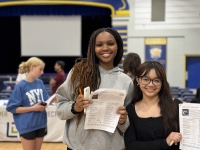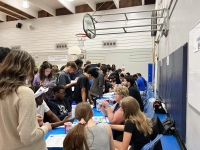The Game of Life
Regina Public Library
Innovation Synopsis
The Regina Public Library’s Game of Life: Financial Reality Check is an interactive simulation that equips high school students with real-world money management skills. Each participant assumes one of ten diverse adult personas based on locally researched income and family scenarios, then works to balance a monthly budget by navigating ten life-scenario booths—covering housing, transportation, childcare, unexpected expenses, and more—each staffed by community experts. Grounded in hyper-local data, the program bridges the gap between classroom theory and practical financial decision-making while its collaborative model fosters meaningful connections among local businesses, government agencies, and non-profits to deliver an authentic and lasting learning experience.
Challenge/Opportunity
Traditional financial literacy education often stops at theory. Students rarely experience the real trade-offs of adulthood—choosing between rent and transportation, managing debt, or saving for emergencies. This leaves them unprepared for life’s financial realities. Compounding the issue, most learning resources use generic national data, overlooking the sharp local variations in wages, housing, etc. that define the true cost of living. Without that context, money management feels abstract and irrelevant. Schools are hesitate to partner with businesses and financial institutions, fearing that sales motives may overshadow genuine education. As a result, practical, hands-on, financial learning is rare. The Game of Life breaks through these barriers, leveraging the Library’s reputation as a valued community partner. This allows the program to use local data guided by cross-sector collaboration to create an immersive learning experience that turns financial theory into real-world practice
Key Elements of Innovation
At its core, Game of Life: Financial Reality Check positions the Regina Public Library as a community convener—designing the framework and uniting schools, financial institutions, health authorities, and local businesses into a shared learning ecosystem that extends far beyond the classroom. The simulation is powered by authentic local data—Saskatchewan wages, federal and provincial tax brackets, government benefits, rental rates, housing prices, childcare, groceries, and insurance—making every decision feel immediate and relevant. Through transformative role-playing, students embody diverse adult personas, from single parents to professionals and service workers, each facing unique financial pressures. This immersive experience compels them to confront inequality, make trade-offs, and practice real-world financial decision-making in a safe yet powerfully authentic environment that connects theory to lived reality.
Achieved Outcomes
Launched in November 2024, the program has engaged six schools in the 2024/2025 year, reaching over 600 students and mobilizing nearly 300 community volunteers. New school sign-ups are underway for 2025/2026, with the first two sessions set for Nov 4, 2025. Teachers praised its unparalleled realism, noting it “far outstrips any budgeting exercise offered in a classroom.” Volunteers from businesses and community organizations value the meaningful, organic interactions with students on topics tied to their expertise. Financial institutions commend this innovative school engagement approach and plan to expand staff participation and explore sponsorships. Future metrics will track growth in students’ financial confidence and understanding, as well as year-over-year increases in participation and partner engagement



